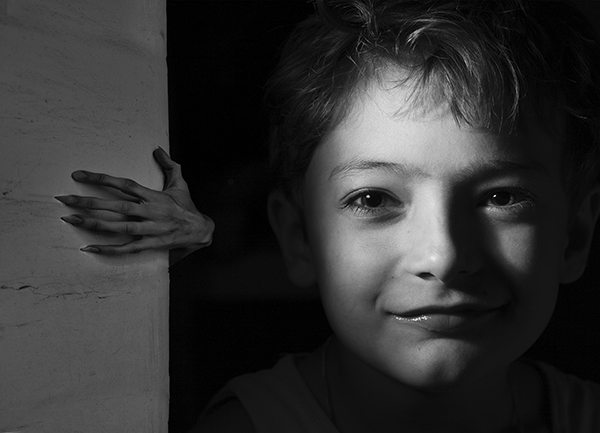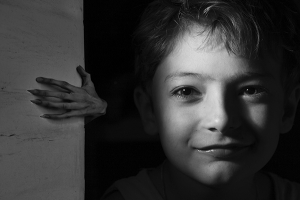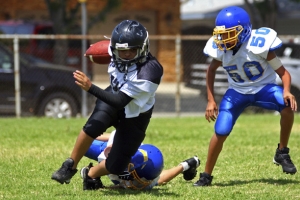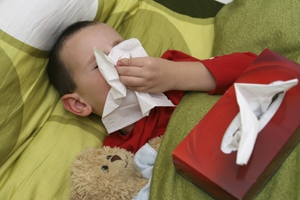
Avoid ideas like "monster spray" which only affirm in a child's mind that monsters are real and need to be "sprayed away." - Berkley James, pediatric sleep consultant
Fear of the dark is a normal part of development and one of the most common childhood problems plaguing families of school-age children. According to Dr. Jane Sosland, a clinical child and adolescent psychologist, nearly 30 percent of children have sleep problems and oftentimes, bedtime battles can last well past midnight. Without a good night's sleep, children can suffer behavior and mood issues and have trouble concentrating at school. So, how can parents best support a frightened kiddo?
Discuss the fear. Listen carefully to your child, without playing into their fears, to see if you can identify a trigger. Nighttime fear might be caused by a fairy tale before bed or even a stressful event during the school day. Other times, the fear won't make much sense at all.
"Just by hearing what kids are saying, helps them feel heard and validated, which can help eliminate irrational fears," explains Berkley James, a pediatric sleep consultant.
Be Aware of frightening images. As kids wind down after a busy day and the quiet of the night sets in, they may begin to replay scary images in their heads that they saw in books, movies, video games or on the news. Pair those visuals with nighttime creaks of the house or a strange shadow on the wall, and you've got a wide-eyed kid at midnight.
Limit exposure to violent images and turn off the news when your youngster is around. According to a 2016 study published in Frontiers in Pediatrics, exposure to repeated images of terrorism in the media can negatively affect a child's emotional health. "These almost live events can cause feelings of hopelessness and helplessness," the researchers write. They can also make kids feel unsafe.
But alarming images aren't the only source of terror. "Kids are quite imaginative. They imagine all sorts of things in the dark that aren't there," Sosland says. Young children often can't distinguish between fantasy and reality. If they imagine a monster in the closet, in their mind it must be there.
Switch on the light. If your kiddo can only fall asleep if her ceiling light is on, relax. Over time, dim the light. Gradually move toward the soft, warm glow of a lamp, then a closet light, and finally a night light that is yellow or orange in color.
"Salt lamps are a great example of a soothing hue," James says. “Avoid bright or blue lights which stimulate the brain to produce cortisol, a wake-up hormone."
Teach breathing techniques. If your child already struggles with anxiety, teach him coping mechanisms during the day that you can employ at night too. For example, have a younger child blow bubbles to calm down. Teach older children deep belly breathing. Have them breathe in for five seconds and slowly breath out as if you have a birthday candle in front of you. "But you don't want to blow it out. You just want the 'flame' to flicker," Sosland advises.
Offer a transitional object. Comfort your youngster with a stuffed animal or a special blanket to help him sleep. If you've become your child's favorite teddy bear, begin phasing out his reliance on you by getting up just as he's falling asleep. If he starts to protest, promise that you'll check in on him in five minutes.
If he's in the habit of snuggling up with you in your bed and you prefer independent sleeping arrangements, have him transition to a spot next to your bed. Eventually, move his bed back to his own bedroom. If getting your child to sleep in his own bed becomes a struggle, set up a token reward system using items like marbles or gold stars that can be cashed in for rewards.
"You can't make them sleep, but you can reward them for staying in their room," Sosland says.
Set up a sleep-promoting environment. White noise, fans, sound machines and soft background music can push back the deafening silence of the night. Also make sure your child's bed is comfortable, the room temperature is cool and put away distracting electronic devices.
Stick with a bedtime routine. Take time to reminisce about happy events from the day. Listen to soothing music and avoid electronics. Read a calming, uplifting book together before bed. And help kids have positive images as they're drifting off to sleep, like playing with a favorite pet.
If your child's nighttime anxiety worsens, consult your family physician.
- Facts about Fear of the Dark
- Fear of the dark usually begins around age 2 or 3.
- Fear of the dark can continue into early adolescence.
- Among 8 to 12-year-olds, it's the third most common and upsetting fear.
Source: Jane Sosland, Ph.D.
Freelance journalist Christa Melnyk Hines is the mom of two boys. She finds that the spooky Halloween season can make nighttime's shadows, creaks and groans even creepier.
Published October 2017



















